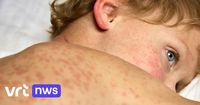Hospitals in Antwerp are currently facing a troubling surge in measles cases, with the number of affected children at the Ziekenhuis aan de Stroom (ZAS) already surpassing the total for all of 2024. According to Daan Van Brusselen, a pediatric infectious disease specialist at ZAS, the situation has escalated alarmingly. "I did not expect it to be this dramatic," he stated. "Last night, four children were admitted to ZAS Vincentius in the city center, bringing the total to fifteen, which is already more than normal for an entire year. It seems to be an explosive increase." Two of these children have been admitted to the intensive care unit, raising serious concerns among health officials.
The Department of Care has confirmed 55 cases of measles in Flanders this year, with 23 of these cases originating from the province of Antwerp. This figure is particularly alarming considering that in the entirety of 2024, only 120 cases were recorded, and in previous years, the annual count ranged between 30 and 50 infections. The current outbreak appears to be fueled by a significantly low vaccination rate in central Antwerp, where most of the affected children are unvaccinated. "We see a growing number of unvaccinated children in daycare centers and schools, which poses a risk to infants under one year old who are not yet eligible for vaccination," Van Brusselen explained.
Measles is one of the most contagious diseases known, with one infected individual capable of transmitting the virus to twelve to eighteen unvaccinated people. In contrast, a person infected with the flu typically infects only 1.2 to 1.5 others. This high transmissibility has prompted ZAS pediatricians to recommend that anyone who has not yet been vaccinated should do so as soon as possible, either at the hospital or through their general practitioner. The vaccination is provided free of charge.
For those who have never had measles and have not been fully vaccinated, the risk of contracting the disease remains significant. Children in Flanders receive their first measles vaccination at one year old, followed by a booster shot between the ages of seven and nine. However, adults aged between 30 and 45 are urged to check their vaccination status, as many in this age group only received one dose as children.
The initial symptoms of measles include a high fever, coughing, and red, inflamed eyes, which typically appear one to two weeks after infection. A rough skin rash then develops behind the ears three to seven days after the onset of these symptoms, spreading across the body. Complications can arise, including pneumonia, diarrhea, and even encephalitis. Van Brusselen warns, "Measles can even be fatal in Belgium. Recently, two unvaccinated children, aged six and eight, died in the United States due to complications from the disease. If one is unfortunate enough to develop encephalitis, there can also be lasting neurological damage afterward."
The alarming rise in measles cases in Antwerp highlights the urgent need for increased vaccination efforts. With the current outbreak, health officials are calling for immediate action to protect vulnerable populations, particularly infants who are too young to be vaccinated. The importance of vaccination cannot be overstated, as it not only protects individuals but also contributes to community immunity, safeguarding those who cannot be vaccinated due to age or health conditions.
As the situation continues to develop, health authorities are closely monitoring the outbreak and urging the public to remain vigilant. The message is clear: vaccination is a critical tool in preventing the spread of measles and ensuring the health and safety of the community. Parents are encouraged to take proactive steps to ensure their children are vaccinated, and adults should verify their vaccination status to help curb the outbreak.
In conclusion, the rise in measles cases in Antwerp serves as a stark reminder of the importance of vaccination in public health. As health officials work to address this outbreak, the community's cooperation in vaccination efforts will be vital in controlling the spread of this highly contagious disease.


